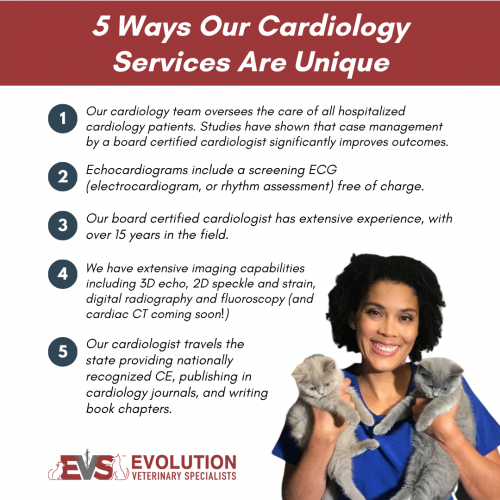5 Signs That Your Pet Might Need a Cancer Veterinary Near Me}
Discovering the Vital Providers Offered by a Vet Cardiologist: Comprehending Ultrasound and CT Scan Methods
Vet cardiologists play an essential function in the health and wellness of pets by detecting and treating various heart conditions. They use sophisticated imaging methods, such as heart ultrasound and CT scans, to provide exact assessments. Each approach has its distinctive advantages and applications. Recognizing these methods is necessary for family pet proprietors seeking the ideal take care of their buddies. What factors should animal owners consider when choosing between these diagnostic devices?

The Function of Vet Cardiologists in Animal Medical Care
Vet cardiologists play an essential role in the healthcare of pet dogs, concentrating especially on identifying and dealing with heart-related problems. They possess specialized training that enables them to translate intricate analysis tests and recognize various cardio concerns. These specialists use innovative strategies, such as echocardiography and electrocardiography, to analyze heart function and structure accurately.Veterinary cardiologists likewise create tailored therapy strategies that may include medicines, lifestyle alterations, and, in many cases, medical interventions. Their knowledge includes enlightening animal proprietors about heart health, highlighting the importance of routine check-ups and very early detection of prospective problems. Collaboration with general veterinarians is vital, as it ensures extensive care for family pets with thought cardiac issues. By supplying specialized solutions, vet cardiologists considerably enhance the lifestyle for pet dogs and offer assurance for their owners, strengthening the significance of heart wellness in general pet wellness.
Usual Heart Issues in Pets
Typical heart concerns in family pets can considerably affect their health and wellness and high quality of life. Heart murmurs, different sorts of cardiomyopathy, and congenital heart defects are amongst one of the most common problems that veterinarians run into. Cancer Veterinary Near Me. Understanding these concerns is crucial for pet proprietors to assure timely medical diagnosis and appropriate treatment
Heart Murmurs in Pets
Although heart whisperings can be a source of worry for pet dog proprietors, they are not constantly indicative of serious health problems. A heart murmur is an unusual audio created by unstable blood flow within the heart. In family pets, these murmurs can be brought on by numerous variables, including genetic heart issues, shutoff problems, or even stress during evaluations. Numerous animals with heart murmurs lead typical lives without significant wellness influences. To figure out the underlying cause, veterinary cardiologists often employ analysis strategies such as echocardiograms and Doppler ultrasounds. Early detection and evaluation are important, as they might assist handle any prospective cardiac concerns effectively. Animal proprietors are encouraged to consult their vet for a comprehensive examination if a heart whispering is identified.
Cardiomyopathy Kind Explained
Cardiomyopathy includes a team of diseases affecting the heart muscular tissue, bring about compromised heart function in pets. The most typical kinds consist of dilated cardiomyopathy (DCM), hypertrophic cardiomyopathy (HCM), and limiting cardiomyopathy (RCM) DCM primarily influences pet dogs, creating the heart to increase the size of and deteriorate, which lessens its capability to pump blood effectively. In comparison, HCM is extra widespread in cats, identified by the enlarging of the heart walls, typically leading to blocked blood flow. RCM, though less common, happens when the heart muscular tissue comes to be rigid, limiting its capacity to fill up with blood. Each type presents one-of-a-kind difficulties in medical diagnosis and treatment, demanding specialized vet cardiological examination to guarantee peak management and take care of influenced family pets.
Congenital Heart Issues
Genetic heart defects represent a considerable classification of cardiac issues in pets, distinctive from obtained problems such as cardiomyopathy - Cancer Veterinary Near Me. These flaws are structural problems existing at birth, influencing the heart's regular function. Common types consist of license ductus arteriosus, ventricular septal problems, and pulmonic stenosis. Symptoms may vary extensively, varying from moderate to severe, and can include workout intolerance, coughing, and difficulty breathing. Early medical diagnosis through sophisticated imaging techniques like ultrasound is vital for reliable monitoring. Veterinary cardiologists play a vital role in recognizing these conditions and advising appropriate therapy options, which may include clinical administration or surgical treatment. Identifying congenital heart flaws enables better outcomes and boosted lifestyle for impacted family pets
Recognizing Cardiac Ultrasound: Exactly How It Works
A significant variety of veterinary methods now use heart ultrasound as a necessary analysis device for reviewing heart health in pets. This non-invasive strategy makes use of high-frequency sound waves to produce photos of the heart's structure and function. Throughout the treatment, a veterinary technician applies a gel to the pet's breast and makes use of a transducer to discharge ultrasound waves. These waves jump off the heart and surrounding structures, creating real-time images on a monitor.Veterinarians can evaluate different elements of heart health, including chamber size, wall activity, and shutoff feature. Furthermore, cardiac ultrasound permits for the discovery of problems such as fluid buildup and hereditary heart defects. This strategy is important for detecting problems that might not be visible with basic radiographs. By providing thorough details concerning the heart's composition and efficiency, heart ultrasound help in creating reliable treatment prepare for pets dealing with heart condition.
The Relevance of CT Scans in Detecting Heart Conditions
Just how do CT scans boost the medical diagnosis of heart problems in vet medication? CT scans offer thorough get redirected here cross-sectional pictures of the heart and surrounding structures, permitting veterinarians to visualize intricate physiological partnerships. This imaging technique is especially helpful in recognizing hereditary heart defects, heart growths, and abnormalities in blood vessels. By making use of sophisticated imaging formulas, CT scans can examine heart chamber dimensions and function, using a comprehensive view that might be hard to accomplish with traditional methods.Additionally, CT angiography can visualize blood flow and identify locations of constriction or obstruction, which is necessary for intending possible interventions. The rate and accuracy of CT scans additionally assist in quick diagnoses, important in emergency situations. Eventually, the consolidation of CT checks right into vet cardiology greatly improves the accuracy of medical diagnoses, allowing targeted therapy strategies and enhancing individual outcomes for animals dealing with heart problems.
Comparing Ultrasound and CT Scan Strategies
While both ultrasound and CT scans are important devices in veterinary cardiology, they offer distinctive advantages and constraints that affect their use in detecting heart problems. Ultrasound, or echocardiography, gives real-time imaging of the heart's framework and function, allowing vets to assess heart chambers, valves, and blood flow. It is particularly efficient for assessing problems like congestive heart failure and cardiomyopathy. Ultrasound might be limited in picturing certain physiological frameworks due to individual dimension or obesity.In comparison, CT checks offer detailed cross-sectional photos of the heart and bordering tissues, making them ideal for determining architectural irregularities, lumps, or vascular problems. Although CT scans give extensive understandings, they call for sedation and might entail radiation direct exposure. Ultimately, the option in between ultrasound and CT checks depends on the particular medical scenario, the individual's problem, and the details needed my company for an accurate diagnosis.
Treatment Choices Offered Through Vet Cardiology
Vet cardiology uses a variety of treatment choices customized to address various heart disease in pets. Therapy strategies commonly begin with lifestyle adjustments, including diet changes and workout modifications, targeted at improving overall heart health and wellness. Drugs play an important function, with cardiologists recommending medications such as diuretics, beta-blockers, and ACE inhibitors to boost and take care of symptoms cardiac function.In a lot more extreme cases, interventional procedures, such as balloon valvuloplasty or stent placement, might be necessary to minimize blockages or boost blood flow. For sure hereditary heart flaws, surgical options might be checked out to remedy structural problems. Furthermore, continuous tracking and follow-up treatment are essential elements of a thorough treatment strategy, permitting timely modifications based on the pet's response to treatment. In general, veterinary cardiology focuses on offering effective, personalized like optimize the health and wellness and wellness of pet patients with heart problems.
Exactly how to Prepare Your Pet for a Cardiac Examination
Preparing a family pet for a cardiac evaluation is vital to assure accurate results and a smooth procedure. Owners must initially set up the consultation with the veterinary cardiologist and go over any kind of particular requirements or concerns. It is recommended to hold back food for at the very least 12 hours prior to the assessment, as this helps boost imaging top quality during procedures like ultrasound i loved this or CT scans.Additionally, maintaining a tranquil setting on the day of the appointment can help in reducing the pet's anxiety. It is helpful to bring along any type of pertinent medical records, including previous examinations and medicines (Cancer Veterinary Near Me). Proprietors need to likewise make sure that their pet fits and leashed throughout transportation to the center. Familiarizing themselves with the evaluation procedure can assist and ease worries in asking notified inquiries throughout the appointment. By following these actions, proprietors can contribute significantly to the efficiency of the heart analysis
Often Asked Questions
How Lengthy Does a Cardiac Ultrasound or CT Check Take?
The period of a cardiac ultrasound commonly ranges from 30 to 60 minutes, while a CT check might take around 15 to half an hour. Aspects such as the individual's condition can affect these time price quotes.

Are There Any Type Of Threats Linked With These Diagnostic Procedures?

Can I Stick With My Family Pet Throughout the Procedure?
The vet center's policy usually dictates whether family pet proprietors can stay throughout procedures. While some facilities motivate proprietor existence for comfort, others might need splitting up to ensure security and ideal conditions for analysis imaging.
How Much Do These Diagnostic Tests Generally Price?
The costs of analysis tests, such as ultrasound and CT scans, typically differ based upon location and facility. Normally, rates vary from a couple of hundred to over a thousand dollars, showing the intricacy and technology included.
What Is the Recuperation Refine After a Cardiac Analysis?
The recovery process after a heart evaluation includes monitoring the family pet for any immediate responses, guaranteeing comfort, and limiting physical activity. Vets normally give post-evaluation instructions to assist family pet owners throughout this necessary recuperation duration. Heart murmurs, various kinds of cardiomyopathy, and hereditary heart issues are among the most common problems that vets run into. A heart murmur is an unusual sound generated by stormy blood circulation within the heart. Cardiomyopathy incorporates a group of conditions influencing the heart muscle, leading to jeopardized heart feature in pets. Genetic heart problems stand for a significant group of cardiac concerns in family pets, unique from gotten conditions such as cardiomyopathy. Ultrasound, or echocardiography, gives real-time imaging of the heart's framework and feature, enabling vets to evaluate heart chambers, valves, and blood flow.